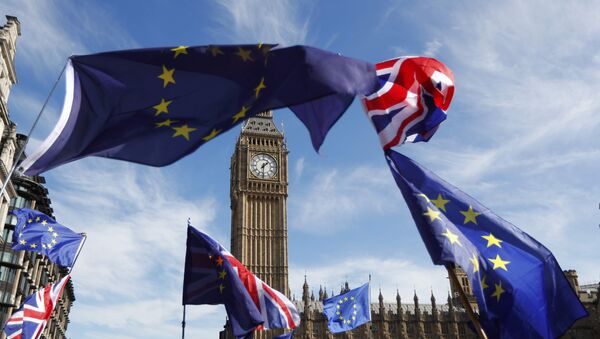British Prime Minister Theresa May managed to bring her cabinet to an agreement on Brexit Friday, overcoming division between her ministers and winning support for "a business-friendly" proposal, which is supposed to fuel the stalled talks with the EU about the United Kingdom's withdrawal from that political and economic union.
The plan centers around a "free trade area" for goods, while acknowledging that the service sector will no longer enjoy free access to the EU's single market, Business Times reports. At the same time, the agreement ends the unregulated freedom of movement and supremacy of the European Court, which might become grounds for accusing May of picking the best parts of the EU.
The plan says that border checks between Northern Ireland and the Republic of Ireland will be avoided, according to a review by AFP.
Going Rogue
Issues with the agricultural, food and fisheries products supply is said to be smoothed out first and foremost, along with some supply chains and processes that are vital to various industries, including automobile manufacturing. At the same time, the UK will abandon the EU's Common Agricultural Policy and Common Fisheries Policy.
Britain would reserve the right under this plan to shape the international standards on which those trade rules are based, and also delegate the right to reject any new EU rules to the British Parliament.
The plan allows Britain to independently impose trade tariffs and seal new free trade deals, the Business Times report.
As for services and banking, which would inevitably lose free access to the EU market, the new deal says the UK will retain "regulatory flexibility" for its services sector, which dominates the British economy.
Playing by the Book
At the same time, the United Kingdom pledges to maintain common standards on state aid rules and establish "cooperative arrangements between regulators" on competition. In addition, the plan says that both the EU and the UK will play along the same high standards on environment, climate change, social protection, consumer protection and employment policies.
"Both sides would need to agree a means of resolving disputes, including through binding independent arbitration," AFP noted.
While the agreement would end freedom of movement, it does not forbid EU and UK citizens from applying for studying and working on each other's territory.
Hardline Brexiters have already accused May may of "tying" UK to EU standards. However, companies have welcomed the compromise deal, as they most feared possible border checks and tariffs.




